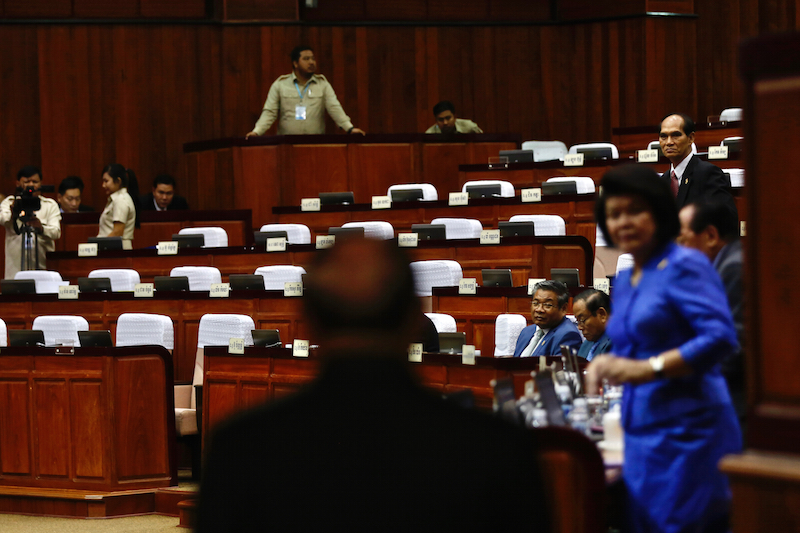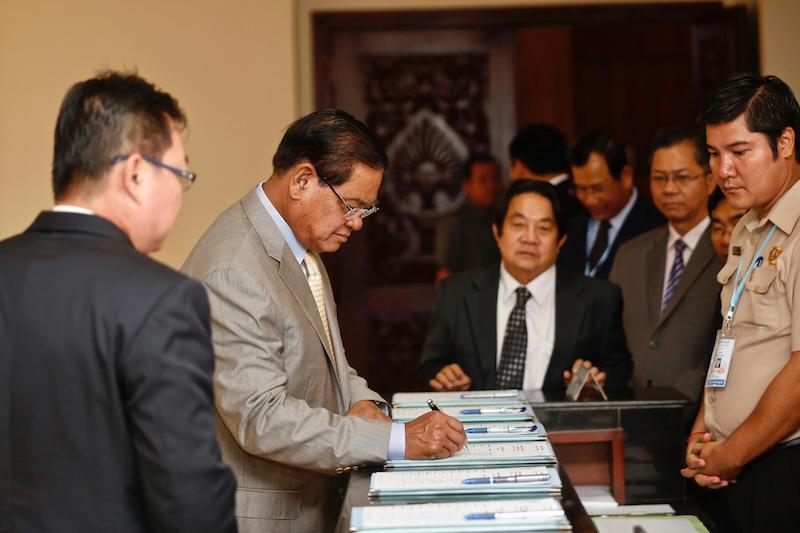The ruling CPP on Monday passed contentious new rules that will make it illegal for the CNRP to even appear to be coordinating with popular opposition figure Sam Rainsy, in a National Assembly vote that was boycotted by the CNRP, which called the changes unconstitutional.
It was the second set of changes the CPP has made to the Law on Political Parties this year to put pressure on the CNRP, its main rival in next year’s national elections. In February, during another CNRP boycott, the CPP passed changes that gave the government and courts sweeping new powers to suspend and dissolve any party over vaguely worded offenses. Those changes forced Mr. Rainsy to resign as CNRP president lest his multiple convictions—widely seen as politically motivated—put his party at risk.

The latest amendments bar parties from using the voice, image or writings of anyone convicted of a felony or misdemeanor or from “openly or tacitly agreeing or conspiring” with one for political gain. Parties that violate the law could be suspended for five years or dissolved altogether.
Despite living abroad to avoid the prison sentences attached to his convictions, Mr. Rainsy remains a popular symbol of CPP opposition and has kept up a steady barrage of online attacks that have continued to rattle Prime Minister Hun Sen. CNRP posters across the country still show Mr. Rainsy clasping raised hands with his deputy-cum-successor Kem Sokha.
In a radio interview last week, CPP spokesman Sok Eysan said the legal changes were crafted specifically to “kill Sam Rainsy’s political career.”
In an hour of speeches leading up to Monday’s vote, however, CPP lawmaker Mom Chim Huy insisted the amendments—aimed at no specific party—were intended “to ensure transparency and justice.”
“We respect the Constitution and all existing laws,” he said. “It has no ill intent to cause difficulty for this or that party, for this or that group.”
Mr. Hun Sen skipped the vote. But his youngest son, Hun Many, a fellow CPP lawmaker, soon belied his colleague’s claims that the amendments had no political targets. In defending the changes, he cited with scorn remarks Mr. Rainsy made last year suggesting the E.U. reconsider its duty-free access for Cambodian garment imports over the government’s human rights record. Mr. Many then turned his attention to Mr. Sokha, who in May lamented the dearth of toilets across the country in a dig at the government.

Interior Minister Sar Kheng signs into a session of the National Assembly on Monday at which the CPP approved amendments to the Law on Political Parties in a vote boycotted by the opposition. (Siv Channa/The Cambodia Daily)
“Please, politicians, don’t use the country’s face just to get a few votes…by saying that Khmer are very poor and cannot afford toilets,” he said. “We should consider whether some images, activities or speech affect national security and the interests of the nation.”
The amendments as proposed were approved without changes by 66 votes to none.
The CNRP released a statement dismissing the changes as politically motivated. The amendments, it said, were “not in accordance with the principle of the rule of law and against the principles of a liberal multiparty democracy, which are ensured by the Constitution of the Kingdom of Cambodia.”
Contacted after the vote, CNRP lawmaker Son Chhay said rules restricting any Cambodian’s rights to political participation were in clear breach of the country’s top law.
“If the rights of people to join in political affairs are eliminated because of these amendments, I think that is enough to say it violates the Constitution,” he said. “There is the rule of law and there is rule by law. What they are doing is rule by law.”
Mr. Chhay said he hoped the international community would help pressure the government into reversing the amendments and that the CNRP would consider asking King Norodom Sihamoni not to sign them into law.
But international condemnation of the first set of amendments earlier this year have had no discernable effect, and the king has never openly refused to sign off on legislation passed by the Assembly. While the king was abroad earlier this year, the first set of changes were signed into law by Senate President and CPP stalwart Say Chhum, who serves as acting head of state in the king’s absence.
Mr. Chhay said the changes would affect the CNRP’s relationship with Mr. Rainsy but declined to discuss how. He said the party would schedule a discussion with its former president soon to consider the implications.
At the very least, it will likely mean removing Mr. Rainsy’s image from the hundreds, if not thousands, of party posters and billboards across the country.
But Mr. Chhay said the government’s efforts to erase Mr. Rainsy from the public conscience would only backfire by drawing more scorn onto the CPP.
“The loss of some photos does not mean the people will forget him,” he said.
The CPP’s own internal data suggests he may be right. An opinion poll commissioned by the ruling party last year, and leaked to the media last month, found that efforts to curtail the CNRP’s election campaigning were more likely to make people vote for the opposition.
In a statement of his own on the new amendments, Mr. Rainsy said he was honored by Mr. Hun Sen’s “obsession” with him.
“In a friendly and responsible way I suggest that, as prime minister, he would better use his time and energy to—among other things—push for the adoption of really useful laws aimed at putting things right in a country that is just upside down,” he said.
“He should also show his vision of a modern and progressive Cambodia instead of continuously behaving like a Khmer Rouge military commander, which he was.”
Likening himself to a legend, Mr. Rainsy said the prime minister should have learned after years of trying to sideline him that his efforts were futile.
“As in any religion, legend or myth,” he said, “the more you strive to kill the central figure, the more he remains alive and becomes more and more vibrant and popular.”



